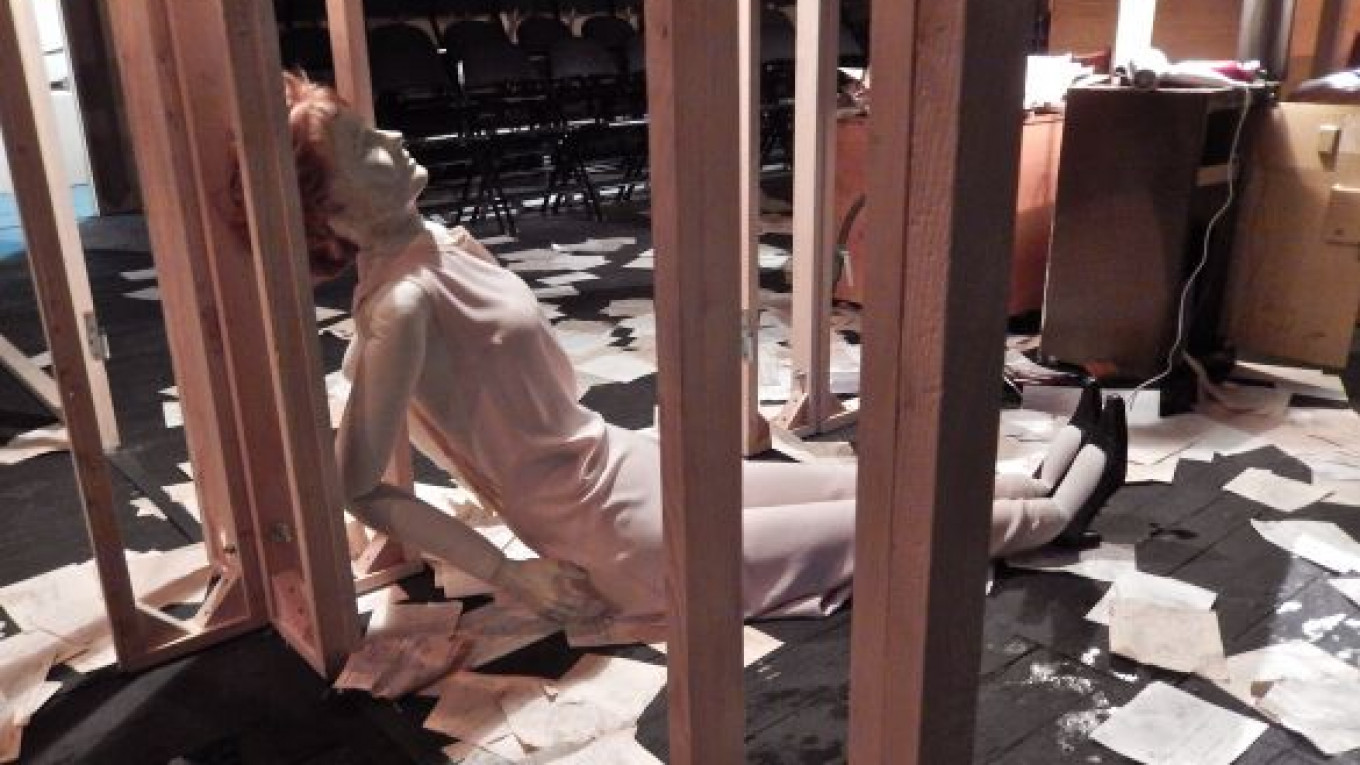Any story you hear is only part of a greater whole. It's an obvious fact, but one we usually forget to consider, at least in the theater. Then along comes a show like "The Tale About What We Can and What We Can't," which actually incorporates that truth into its structure.
To say this production is performed on the Small Stage of the Chekhov Moscow Art Theater is only to provide information that will get you to the right place once you have a ticket in hand. In fact, it takes place in four discrete cubicles, each seating 40 spectators, who, for most of the performance, are isolated from one another by cardboard walls. We occasionally hear unseen spectators laughing or murmuring, thus letting us know something is happening even though we don't know what it is.
I was one of those seated in the dingy office of police chief Oleg Makhmudov. As I learned towards the end of the show, others were seated in locations that looked like lounges or living rooms. All of us heard much of what was said through the flimsy walls, but none of us saw all elements of the story being played out.
Another important aspect of the hermetic environment created by designer Ksenia Peretrukhina is the claustrophobia it breeds. The ceiling is low, the walls are tight, the furnishings are cheap, the atmosphere is aggressive. Almost immediately, before anything has been said, done or seen, one gets the impression that nothing good is going to come out of whatever awaits us. A powerful, physical sense of change grips us when the walls and ceilings fall away.
Until that moment crucial scenes are delivered to all spectators in various ways. Sometimes characters gather at doorways linking all four cubicles so that some audience members see a scene from behind, while others see it straight on or from the side. Actors may run from room to room, thus allowing some of the spectators to see some of the action some of the time.
Not surprisingly, the details of the story are rather obscure.
Alexei Kravchenko plays the shady chief Makhmudov ruling over a police station riddled with corruption and fear. Some of his underlings are making moves to bolster their careers either by ingratiating themselves to him or by challenging his authority. Everyone turns a blind eye to his odd sexual shenanigans whereby he has prostitutes engage in lewd acts with his own life size puppet while he looks on from the shadows. And everyone obeys sheepishly when he brings in a misanthropic priest to bless the station's walls.
Equilibrium at the station disintegrates when one of the chief's subordinates organizes the raid of a home occupied by the chief's lover, Marina (Natalya Kudryashova). Her criminal activities, it is clear, could not have been carried out without Makhmudov's knowledge and patronage, and what ensues is a fight to the death as to who is going to control this information.
Mikhail Durnenkov wrote this compelling text on the basis of an old, unused screenplay by Pyotr Lutsik and Alexei Samoryadov, best known for their scripts for "Dyuba-Dyuba" and "Limita" in the early 1990s. In Durnenkov's hands the story, the language and the interweaving of characters and events is entirely contemporary. It has the feel of a real-life story transferred directly to the stage.
Director Marat Gatsalov, a Best Director Golden Mask winner earlier this year, once again showed why he is one of the most distinctive directors to emerge in the last five years. He turns to advantage every difficulty thrown his way by Peretrukhina's bold design.
Over the course of the performance we rarely, if ever, are drawn into the story's potential for melodrama. Instead, we are imperfect witnesses to a tale about the effect that excessive power has on people. One way or another it breaks everyone, even those who remain standing.
"The Tale About What We Can and What We Can't" is acted with impressive veracity by the entire cast, led by Kravchenko's stunning, dark Makhmudov. In a young season already marked by several major achievements, Gatsalov, Durnenkov and Peretrukhina have given us still another.
"The Tale About What We Can and What We Can't" (Skazka o Tom, Chto My Mozhem, a Chego Net) plays on the Small Stage of the Chekhov Moscow Art Theater, 3 Kamergersky Pereulok. Metro Okhotny Ryad. 495-629-5370. mxat.ru. Running time: 2 hours, 10 minutes.
Contact the author at [email protected]
Related articles:
A Message from The Moscow Times:
Dear readers,
We are facing unprecedented challenges. Russia's Prosecutor General's Office has designated The Moscow Times as an "undesirable" organization, criminalizing our work and putting our staff at risk of prosecution. This follows our earlier unjust labeling as a "foreign agent."
These actions are direct attempts to silence independent journalism in Russia. The authorities claim our work "discredits the decisions of the Russian leadership." We see things differently: we strive to provide accurate, unbiased reporting on Russia.
We, the journalists of The Moscow Times, refuse to be silenced. But to continue our work, we need your help.
Your support, no matter how small, makes a world of difference. If you can, please support us monthly starting from just $2. It's quick to set up, and every contribution makes a significant impact.
By supporting The Moscow Times, you're defending open, independent journalism in the face of repression. Thank you for standing with us.
Remind me later.







